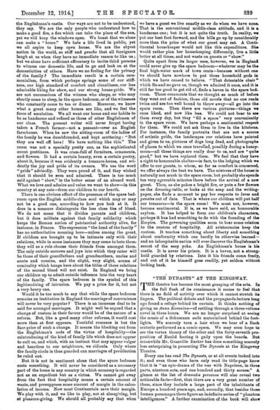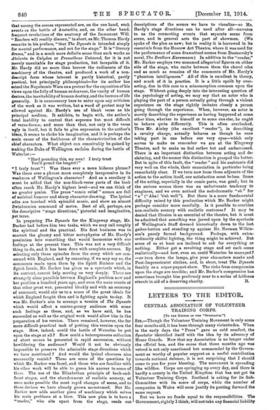"THE DYNASTS" AT THE KINGSWAY.
THE theatre has become the most grasping of the arts. In the full flush of its renaissance it seems to feel that there is no field of activity over which it cannot stretch its fingers. The political debate and the propaganda lecture long ago found a refuge behind its curtain. It thinks nothing of giving us Anna Karenina—of rattling through a three-volume novel in three hours. We are no longer surprised at seeing the music of a Schumann suite materialized behind the foot- lights. We scarcely turn a hair when we hear of a Bach oratorio performed as a comic opera. We may soon hope to see the vortex theory of the ether and the forty-seventh pro- position of Euclid footing it gaily upon the boards. But meanwhile Mr. Granville Barker has done something scarcely less enterprising in presenting The Dynasts at the Kingsway Theatre.
Every one has read The Dynasts, or at all events looked into it; and even those who have only read its title-page know that it is " an epic-drama of the war with Napoleon. in three parte, nineteen acts, and one hundred and thirty scenes." A glance at the list of dramatis personae will also reveal two noticeable facts—first, that there are a very great number of them, since they include a large part of the inhabitants of Europe a hundred years ago, and, secondly, that besides these human personages there figure an indefinite series of " phantom intelligences." A further examination of the book will show that among the scenes represented are, on the one hand, such events as the battle of Austerlitz, and, on the other hand, frequent revelations of the anatomy of the Immanent Will. " Readers will readily discern," in short, as Mr. Thomas Hardy remarks in his preface, "that The Dynasts is intended simply for mental performance, and not for the stage." It is " literary drama," and in a much more definite sense than such works as Atalanta in Calydon or Prometheus Unbound, for it is not merely unsuitable for stage production, but incapable of it. Mr. Hardy did no more than borrow the rudiments of the machinery of the theatre, and produced a work of a non- descript form whose interest is partly historical, partly poetical, but principally philosophical—for its author has
seized the Napoleonic Wars as a pretext for the exposition of his views upon the folly of human endeavour, the vanity of human
desires, the inevitability of human destiny, and the horrors of life generally. It is unnecessary here to enter upon any criticism of the work as it was written, but a word of protest may be allowed against Mr. Hardy's use of blank verse as his principal medium. It exhibits, to begin with, the author's total inability to control that supreme but most difficult of verse-forms; and more than that, not only is the verse ugly in itself, but it fails to give expression to the author's ideas, it seems to choke his imagination, and it is perhaps the main cause of the feebleness of the characterization of the chief characters. What object can conceivably be gained by
making the Duke of Wellington exclaim during the battle of Waterloo :— " Hard pounding this, my men! I truly trust You'll pound the longest !"
"I truly trust"! Was there ever a more hideous phrase ? Was there ever a phrase more completely inexpressive in its weakness of Wellington's character? And as a corollary it must be added that the non-blank-verse parts of the book often reach Mr. Hardy's highest level—and we can think of no greater praise. The prose "comic relief " scenes are full of satirical humour and sharp character-drawing. The lyrical odes are touched with splendid music, and show an almost Swinburnian command of metre. Best of all, perhaps, are the descriptive " stage directions," pictorial and imaginative, yet terse.
In preparing The Dynasts for the Kingsway stage, Mr.
Barker bad before him two tasks, which we may call roughly the spiritual and the practical. His first business was to convert the gloomy and bitter metaphysics of Mr. Hardy's pessimism into something that would harmonize with our feelings at the present time. This was not a very difficult thing to do, and it has been done with complete success. By selecting only those episodes from the story which are con- cerned with England, and by censoring, if we may say so, the comments made upon them by the Spirit Sinister and the Spirit Ironic, Mr. Barker has given us a spectacle which, in its content, cannot help moving us very deeply. There are strangely close parallels between England's position now and her position a hundred years ago, and even the mere events of that other great war, presented bleakly and with an economy of comment, would stir us to a sense of the great ideals for which England fought then and is fighting again to-day. It was Mr. Barker's aim to arrange a version of The Dynasts which would affect a contemporary audience with some such feelings as these, and, as we have said, he has succeeded as well as the original work would allow him in the preparation of his version. There remained, however, the far more difficult practical task of putting this version upon the stage. How, indeed, could the battle of Waterloo be put upon the stage at all ? How could a heterogeneous collection of short scenes be presented in rapid succession, without bewildering the audience P Would it not be obviously impossible to preserve the admirable stage directions which we have mentioned P And would the lyrical choruses also necessarily vanish ? These are some of the questions by which Mr. Barker was faced, and those who are familiar with his other work will be able to guess his answer to some of them. The use of the Elizabethan principle of beck-and-
front stages, and the abandonment of realistic scenery, at once make possible the most rapid changes of scene, and to these devices we have already grown accustomed. But Mr. Barker now adds another piece of machinery which solves his main problems at a blow. This new plan is to have a "reader," who sits apart from the stage, reads out
descriptions of the scenes we have to visualize—so Mr. Hardy's stage directions can be used after all—narrates to us the connecting events that separate scene from scene, and in general acts the part of showman. (We spoke of the plan as new; but in reality it is borrowed in its essentials from the Moscow Art Theatre, where it was used for the performance of some dramatized scenes from Dostoevsky's novel, The Brothers Karamazov.) In addition to the "reader," Mr. Barker employs two unnamed allegorical figures on either side of the stage, who recite between them the choral odes and as much as remains of the comments of Mr. Hardy's " phantom intelligences." All of this is excellent in theory, and much of it in practice. It is a little spoilt by over- acting, due in this case to a misconception common upon the stage. Without going deeply into the interesting question of the psychology of acting, we may say that an actor who is playing the part of a person actually going through a violent experience on the stage rightly imitates closely a person going through the experience. When, however, an actor is merely describing the experience as having happened at some other time, whether to himself or to some one else, he ought to behave quite differently. This is often overlooked. Thus Mr. Ainley (the excellent " reader"), in describing a cavalry charge, actually behaves as though he were taking part in one before our very eyes—which only serves to make us remember we are at the Kingsway Theatre, and to make us feel rather hot and embarrassed. There is an important distinction between acting and de- claiming, and the sooner this distinction is grasped the better. But in spite of this fault, the " reader " and his assistants did very well on the whole, their enunciation in particular being remarkably clear. If we turn now from these adjuncts of the action to the action itself, our satisfaction must be less. Some of the acting, especially in the comic parts, was good ; but in the serious scenes there was an unfortunate tendency to staginess, and we even noticed the melodramatic " sh " for " " (" I 'Usti well"). But there is a more fundamental difficulty raised by this production which Mr. Barker might perhaps consider more carefully. Is it possible to combine non-realistic scenery with realistic costumes P It may be denied that illusion is an essential of the theatre, but it must be admitted that something was jarred upon by the spectacle of Wellington's Staff dressed historically down to the last gaiter-button and standing up against Mr. Norman Wilkin- son's purely formal background. Perhaps, with extra- ordinarily skilful lighting, the thing might be achieved. But some of us at least are inclined to ask for everything or nothing. Either get a revolving stage and set each scene realistically—and how, even so, could Waterloo be managed ? —or turn down the lamps, give your characters masks and Post-Impressionist clothes, and, in short, treat The Dynasts frankly as a super-puppet-show. The risks from compromise upon the stage are terrible; and Mr. Barker's compromise has sometimes brought him perilously near to a series of tableaux vivants in aid of a deserving charity. B.















































 Previous page
Previous page